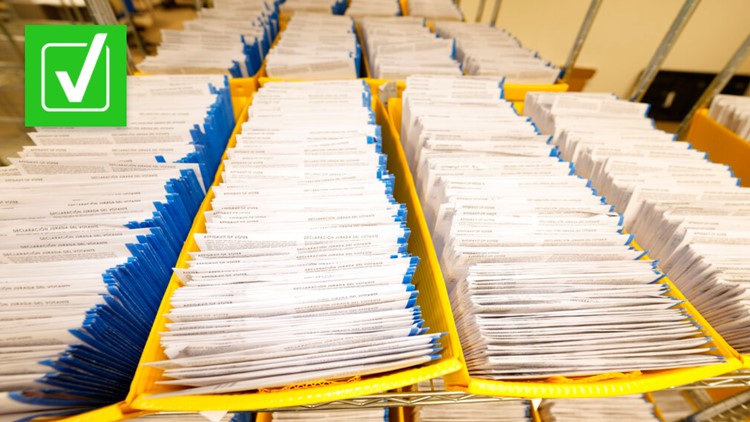Despite viral claims, many states allow poll workers to write on ballots and some actually require it. Here are the rules and what to do if you’re concerned.


In the months leading up to the 2024 presidential election, a warning about poll workers writing on ballots has made the rounds on Facebook.
Those posts claim that a voter’s ballot could be disqualified if a poll worker writes on it and urge people to request a new ballot if that happens.
One version of the chain message that people are sharing on Facebook reads:
“A very reliable good friend of mine just finished poll worker training and she texted me this…Just finished Poll Manager training! I passed all the classes. I want you all to know something…if you are checking in at the polls and they happen to write anything on your ballot before they give it to you to put in the voting machine...a letter, a checkmark, a star, an R or a D any writing of any kind...please request a new ballot. Your ballot could be disqualified if it is written on. Please be on the lookout for this type of behavior.”
Multiple VERIFY readers who have seen similar warnings texted us to say they were concerned about poll workers writing on their ballots and wanted to know if it’s allowed.
THE QUESTION
Can poll workers write on your ballot without disqualifying it?
THE SOURCES
- Rachel Orey, director of the Bipartisan Policy Center’s Elections Project
- North Carolina State Board of Elections
- Elections officials and state laws in Arkansas, Illinois, Maine, Minnesota, Missouri, Montana, North Dakota, South Dakota and Texas
- Massachusetts Secretary of the Commonwealth spokesperson
- Colorado Secretary of State spokesperson
THE ANSWER
![]()
Yes, poll workers in some states can write on your ballot without disqualifying it. Some states actually require election workers to write on your ballot.
WHAT WE FOUND
The viral chain message suggests your vote won’t be counted if your ballot has any extra writing or markings, but we found that’s not the case in many instances.
Many states allow poll workers to write on ballots for various reasons without disqualifying them. Some state laws actually require election workers to write on your ballot.
VERIFY contacted elections officials in all 50 states and found that in at least a dozen, election workers write on or stamp some or all of their voters’ ballots. None of the states that responded to us said a ballot would be disqualified if a poll worker writes on it.
"Whether an election official might need to write on someone’s ballot varies across the country, but marks by an authorized election worker are generally not cause for concern,” Rachel Orey, who serves as director of the Bipartisan Policy Center’s Elections Project, told VERIFY.
Orey also addressed concerns that any stray marks on a ballot will prevent it from being counted.
“Marks by poll workers are not used to determine whether a ballot is counted. All valid votes by eligible voters are counted in every election. Should a stray mark cause a ballot to be rejected by tabulators, that ballot typically undergoes a secondary layer of human review,” they said.
“Election workers often do write on ballots for different reasons as required by law,” the state elections board said.
If a North Carolina resident votes by mail or during the early in-person voting period, election workers write an identifying number that is specific to each voter on their ballot. A voter’s precinct must also be written on their ballot during early voting in some counties, according to the state elections board.
Laws in other states, including Arkansas, Illinois, Minnesota, Missouri, North Dakota and Texas, also require election judges or other election workers to initial or sign voters’ ballots. The requirements for doing so vary by state. In Missouri, a number is often placed in the corner of a ballot, too, according to a spokesperson for the Secretary of State’s Office.
In some states, like Montana and South Dakota, ballots receive an official stamp.
There are other limited circumstances that may require election workers to write on or mark a person’s ballot.
For example, Massachusetts poll workers will only write on a voter’s ballot in the state if it is being challenged or the voter is casting a provisional ballot, according to a spokesperson for the Secretary of the Commonwealth’s Office.
In Maine, an election worker who is known as a warden would write a number on someone’s ballot only if it’s challenged, a spokesperson for the Secretary of State said.
Colorado election workers also mark provisional ballots with a stamp, a spokesperson for the Secretary of State’s Office said.
If a voter is ever concerned about any writing or markings on their ballot, they can ask a poll worker at their polling place for additional information.
Anyone who still has concerns can contact state and local elections officials. USA.gov has an online tool that helps direct people to elections offices in their area.
Voters should be sure to carefully follow the instructions printed on their ballot when filling it out. As a general rule of thumb, you should keep your own markings on the ballot within the bubbles for each contest and completely fill them in.
The VERIFY team works to separate fact from fiction so that you can understand what is true and false. Please consider subscribing to our daily newsletter, text alerts and our YouTube channel. You can also follow us on Snapchat, Instagram, Facebook and TikTok. Learn More »
Follow Us
Want something VERIFIED?
Text: 202-410-8808
.png)









 English (US) ·
English (US) ·